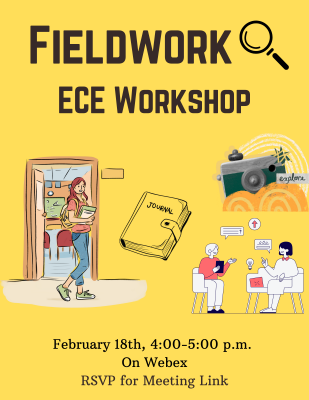On Tuesday, February 18 at 4:00 pm, we are holding a virtual workshop on a vital component of First Year Writing, “Fieldwork”: students conducting primary research and investigation outside of the classroom.

This hands-on, inquiry driven activity provides an opportunity for students to identify the connections between their work in the classroom and materials outside it. As they uncover these connections during fieldwork, students can come to recognize the many ways their writing is relevant to, embedded in, and impactful on the experiences of other individuals and communities. Ahead of the workshop, we thought it would prove valuable to spend some time dissecting and discussing the concept of fieldwork, its role in the FYW curriculum, and explore the possible ways ECE students can conduct fieldwork.
Fieldwork, by definition, entails students’ movement outside the traditional classroom environment. By interacting with spaces, objects, and people outside the classroom, fieldwork invites students to explore questions beyond the walls that (often literally) frame their writing and the content they encounter. These boundaries may, in the minds of students, divorce the significance of their writing from “real-world” happenings, communities, and materials. Fieldwork, therefore, asks students to forge the link between classroom inquiry and their lives outside of school. Not only does this (hopefully) foster an investment and interest in the work they do in the writing classroom, but it also helps students write with ethos.
As Rosanne Carlo writes, “Whenever we are discussing the material and place and people’s experiences, whenever we are talking about ourselves in community, these discourses fall under the rhetorical concept of the ethos appeal” (Transforming Ethos 6-7). Students’ fieldwork efforts bridge the more abstract, wider-scope ideas discussed in the FYW classroom and in their research with the lived experience of students and their communities, particularly in the inquiry driven “reflective narrative and research investigations” that we ask them to compose in First-Year-Writing courses. Fieldwork works to materialize the significance and relevance of their writing, helping them to “communicat[e] lived experience as a form of knowledge” and empowering them to write confidently with ethos (9). Establishing a sense of material and/or personal investment helps students recognize the concrete stakes of their writing, enabling them to realize the purpose of their writing and in turn write with purpose.
Fieldwork is a versatile course component, connecting to the habits of practice in a myriad of ways. It could be the act of collecting, curating, and circulating, or going out into the field to observe these habits of practice in action. Fieldwork may serve as a springboard for later work: establishing an anecdotal understanding of issues that drives further contextualizing research, critical engagement, and public contributions with their writing. Or this broader research may be the framework through which students conduct their fieldwork research. They can examine the way issues or topics they’ve researched and read about are relevant to their own daily lives, communities, and other individuals. In all cases, fieldwork serves as a specific, concrete foundation for composing works that make meaningful contributions to a specific audience. It helps solidify the connection in the mind of the student that the discourse communities they are participating in are just that, communities. They are comprised of real people, places, and objects impacted by the larger issues or topics discussed in class and in their writing. Students’ material awareness of their topics and audience facilitates the composition of meaningful responses to texts and issues, writing alongside other texts rather than about them.
The realization of the material relevance of their writing through physical interactions helps students establish a concrete visualization of what they are writing about and who they are writing for. This in turn fosters an understanding of what it means to be rhetorically effective. It can be easier to identify and deftly weigh rhetorical considerations (considerations of language, tone, modality, etc.) when the intended audience, subject, and stakes of their writing materializes. Familiarity with the spaces their writing will circulate in and the audiences with whom their writing will circulate helps students make nuanced and sophisticated rhetorical considerations. It also brings to the fore the importance of writing ethically. When their work is related to and impacts their communities or spheres that they are deeply familiar with the potential ramifications of writing become more clearly visible.
Bringing this long-winded preface to a close, during our workshop we will discuss prior experiences incorporating fieldwork in the ECE classroom, positive and negative, and share strategies for incorporating fieldwork in your courses—covering potential forms and possible assignments/projects. Finally, we will share some recent scholarship on fieldwork and community-based writing that may help frame or inspire the way you integrate fieldwork into your own syllabus.
If you’re interested in attending the workshop, please RSVP here for the meeting link. We hope to see many of you there, but for those unable to attend all materials will be made available afterwards on our SharePoint site.
Should you wish to read more of Rosanne Carlo’s work (which I highly recommend), you can access her whole book, Transforming Ethos: Place and The Material in Rhetoric and Writing, for free here. Simply log in with your UConn Credentials.
